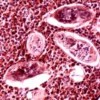Filipe Dantas-Torres, PhD, EBVS® European Veterinary Specialist in Parasitology
Aggeu Magalhães Institute
Fundação Oswaldo Cruz
Brazil
Editor-in-Chief
Aims and scope
Parasites & Vectors publishes articles on the biology of parasites, parasitic diseases, intermediate hosts, vectors and vector-borne pathogens. Manuscripts published in this journal will be available to all worldwide, with no barriers to access, immediately following acceptance. Read more
Featured collections
- Artificial intelligence, parasites, and parasitic diseases
- Primers on parasites and vectors
- Historical aspects of parasitology
- Elimination of infectious diseases of poverty as a key contribution to achieving the SDGs
- Contribution of climate change to the spread of infectious diseases
- Human migration, conflict and infectious diseases
- Food security and sustainability from a microbiology perspective
Artificial intelligence, parasites, and parasitic diseases
This collection is dedicated to articles reporting the use of AI in parasitology research. We particularly welcome articles dealing with parasitic disease diagnosis, parasite and vector identification as well as those reporting the prospection of drugs and vaccine candidates.
Primers on parasites and vectors
Guest Editor: Anthony J Walker
Primers provide short, authoritative and accessible accounts that explore the basic/applied biology of selected parasites, intermediate hosts, vectors and vector-borne pathogens. Primers integrate fundamental aspects of parasite or vector biology with recent, cutting-edge research findings and a discussion of future research needs. Each Primer also includes a downloadable/printable poster.
Historical aspects of parasitology
The reviews presented in this series explore the history of parasitology in a fascinating journey through the main scientific discoveries and breakthroughs in the discipline.
Elimination of infectious diseases of poverty as a key contribution to achieving the SDGs
This cross journal series aims to demonstrate the validity of communicable disease elimination as a key contributor to achieving Universal Health Coverage and the SDGs. It therefore welcomes articles that provide evidence of its wide impact on public health and beyond, on addressing inequities, on the cost-effectiveness of integrated implementation and resulting efficiency gains, underscoring its value as a global good.
Contribution of climate change to the spread of infectious diseases
Cross-journal collection
This collection brings together in one place articles outlining infectious diseases (and their vectors) that are likely to spread or are already spreading across borders due to the effects of climate change. The impact of policy implementation or interventions designed to contain the spread infectious disease, and studies that could inform future global policy or practical solutions are very much welcome.
Human migration, conflict and infectious diseases
Cross-journal collection
This article collection will bring together research, case reports and viewpoints to strengthen understanding on the risks posed by infectious disease and effective and appropriate public health responses during times of armed conflict and forced migration.
Food security and sustainability from a microbiology perspective
Food security is a complex problem: to maintain agricultural productivity on degrading lands and in the face of water scarcity, or to achieve increased agricultural productivity and sustainable food production, many questions need to be answered and solutions need to be tested and implemented. This collection covers various aspects of maintaining or enhancing food production, sustainability and security can be tackled from a microbiology perspective.
Articles
-
-
Efficacy of Bravecto® Plus spot-on solution for cats (280 mg/ml fluralaner and 14 mg/ml moxidectin) in the prevention of feline Aelurostrongylus abstrusus infection evaluated in a multi-diagnostic approach
-
Angiostrongylus cantonensis induces energy imbalance and dyskinesia in mice by reducing the expression of melanin-concentrating hormone
-
Phosphoproteomic analysis reveals changes in A-Raf-related protein phosphorylation in response to Toxoplasma gondii infection in porcine macrophages
-
Echinococcus granulosus ubiquitin-conjugating enzymes (E2D2 and E2N) promote the formation of liver fibrosis in TGFβ1-induced LX-2 cells
Parasites & Vectors Editorial Style Guide
The Parasites & Vectors Editorial Style Guide is intended to provide authors with clear, consistent guidelines for writing manuscripts for submission to Parasites & Vectors. Correct formatting according to these guidelines will not only increase the overall quality of data presentation, but also expedite final decisions and the production time of accepted manuscripts.
Latest Tweets
Your browser needs to have JavaScript enabled to view this timeline
X Parasitology Summer Course (ParSCo), 29 June to 6 July 2024
We are pleased to announce the 10th edition of the Parasitology Summer Course (X ParSCo), which will take place in Basilicata, southern Italy, in the heart of the Mediterranean region, 29 June to 6 July 2024.
The ParSCo is an intense, one-week long course for parasitologists and post-graduate students working in the field of veterinary parasitology.
You can find the course program and application form here.
Heartworm Disease: Today’s Discoveries, Tomorrow’s Practice
This thematic series comprises papers submitted in relation to the 2022 Triennial Symposium of the American Heartworm Society, New Orleans, United States, 8th – 11th September 2022. You can find all the new papers in the collection here.
17th Symposium on Companion Vector-Borne Diseases (CVBD)
This thematic series comprises papers submitted in relation to the 17th Symposium of the CVBD® World Forum, Lisbon, Portugal, 24th – 25th September 2023. You can find the papers as they publish here.
Pan-European tick distributions: where are they now, and where are they going?
This new collection was created for veterinarians, parasitologists and researchers to provide a substantial amount of scientific information around current and projected future tick occurrences at a European-level, along with precise country-level data. You can read the papers in the collection here.
Bugbitten: A Blog for the community, by the community
-

Forecasting zoonotic disease risks in a changing climate
19 April 2024
-

Female genital schistosomiasis needs more attention
12 April 2024
-

Meet the Editors
Editor-in-Chief
Dr. Filipe Dantas-Torres is a researcher at the Aggeu Magalhães Institute and the chair of the Tropical Council for Companion Animal Parasites. He is a veterinarian with a MSc and a DSc in public health and a PhD in animal health and zoonosis. He is an EBVS® European Veterinary Specialist in Parasitology. Dr. Dantas-Torres is an international leader in the field of parasitology, with a focus on vector-borne diseases. His work has been recognized internationally through numerous scientific publications and invited book chapters. In 2010, Dr. Dantas-Torres was elected Fellow of the Royal Entomological Society in recognition of his expertise in the field of medical and veterinary entomology. He has received numerous awards, such as the 2013 Peter Nansen Young Scientist Award and the 2016 Odile Bain Memorial Prize. He is a former Editor-in-Chief of Medical and Veterinary Entomology and has served as a reviewer, associate editor and subject editor of Parasites & Vectors for several years.
Dipteran vectors and associated diseases
Dr. Fredros Okumu is Director of Science at the Ifakara Health Institute and Adjunct Professor at Nelson Mandela African Institute of Science & Technology, Tanzania. He is a mosquito biologist and public health expert working on sustainable approaches for surveillance, prevention and control of vector-borne diseases. He is also passionate about improving ecosystems for young researchers in Africa. His work has been published internationally in several prestigious scientific journals. He tweets @Fredros_Inc and occasionally writes posts for the Malaria World blog.
Dr. Marco Pombi is Associate Professor in Parasitology at the Sapienza University of Rome, Italy. As a medical entomologist, he has worked extensively in malaria endemic countries, exploring several aspects of vector biology, ranging from evolutionary biology, speciation and genetics of mosquitoes, to the ecology and behaviour in relation to their vector role. He has been developing new sampling methods for surveillance, monitoring and control of disease vectors.
Helminths and helminthic diseases
Dr. Martin Walker is Lecturer in Epidemiology at the Royal Veterinary College, UK, and an Honorary Lecturer in the Department of Infectious Disease Epidemiology at Imperial College London. He is an active member of the London Centre for Neglected Tropical Disease Research, the Neglected Tropical Disease Modelling Consortium and leads the schistosomiasis and soil-transmitted helminthiases research theme at the Infectious Disease Data Observatory. Martin’s research interests broadly lie in the use of mathematical techniques, including disease transmission models, to assist public health decision making on interventions aiming to eliminate human helminthiases and other tropical diseases. He is also interested in statistical approaches to identifying antiparasitic drug resistance and the use of modelling to support drug development.
Parasite genetics, genomics and proteomics
Dr. Xing-Quan Zhu was trained as a veterinarian with a BVSc degree and a MVSc degree. He obtained his PhD and acquired postdoctoral training in molecular parasitology at the Department of Veterinary Science, The University of Melbourne, Australia between 1996-2001. He is the Distinguished Professor of Parasitology in the College of Veterinary Medicine, Shanxi Agricultural University, China. His current research integrates “multi-omics”, molecular and immunological approaches to study parasite biology and parasite-host interactions. His work has been recognized internationally through numerous scientific publications in well-regarded international journals including Lancet Infectious Diseases, Clinical Microbiology Reviews, Nature Communications, Trends in Parasitology and Parasites & Vectors.
Parasite immunology
Dr. Friederike Ebner is Assistant Professor in Infection Pathogenesis at the Technical University Munich in Germany. She is steering committee member of the European Veterinary Immunology Group (EVIG). She acquired postdoctoral training in parasite immunology at the Institute for Immunology of the Department of Veterinary Medicine, Freie Universität Berlin, Germany. As an immunologist she researches on the interactions between gastrointestinal helminths and the immune systems of animals and humans. There she aims to understand how immunity is generated and how parasites evade the immune response in order to derive intervention and vaccine strategies from this knowledge.
Parasites of veterinary importance
Dr. Adnan Hodžić received his veterinary degree (DVM) from the University of Sarajevo, Bosnia and Herzegovina, and an MSc in Veterinary Parasitology from the same University. In 2014, he joined the Institute of Parasitology of the University of Veterinary Medicine in Vienna, Austria, where he completed his PhD studies and the EVPC residency program. He now works in the Department of Microbiology and Ecosystem Science at the University of Vienna. He is an EBVS® European Veterinary Specialist in Parasitology. His outstanding scientific contributions in the field of parasitology have been recognized by two international awards (Sinnecker-Kunz Award 2019 and Odile Bain Memorial Prize 2020).
Protozoa and protozoan diseases
Dr. Pegine Walrad is an Associate Professor in the York Biomedical Research Institute at the Univ. of York specialising in parasite lifecycle trans-regulators that promote virulence. Previous work isolated and characterized protein domains and 10 novel interacting cofactors (e.g. Hairless) of Runt/Runx transcription factor in Drosophila, and the first trans-regulator of surface antigens and a novel pathway of mRNA export in Trypanosoma brucei parasites. Current research focuses on genetic regulators of Leishmania parasite differentiation to human-infectious forms.
Ticks and tick-borne diseases
Dr. Anna Bajer is Head of the Department of Eco-epidemiology of Parasitic Diseases at the University of Warsaw, Poland. Dr. Bajer and her lab focus on a range of eco-epidemiological studies on ticks and vector-borne diseases (babesiosis, borreliosis, bartonellosis, dirofilariasis); on factors influencing parasite communities in rodents, model free-living hosts (helminths and haemoparasite community); and on reservoir of intestinal microparasites (Cryptosporidium, Giardia). She has also worked on molecular diversity and molecular phylogeny of micro- and macroparasites of medical and veterinary significance.
Follow
Annual Journal Metrics
-
2022 Citation Impact
3.2 - 2-year Impact Factor
3.6 - 5-year Impact Factor
1.213 - SNIP (Source Normalized Impact per Paper)
0.961 - SJR (SCImago Journal Rank)2023 Speed
5 days submission to first editorial decision for all manuscripts (Median)
82 days submission to accept (Median)2023 Usage
4,110,661 downloads
5,998 Altmetric mentions
Visit the Springer Nature Parasitology Community page
-
At Springer Nature we are committed to raising the quality of academic research in parasitology through leading journals edited by the best Editors in the field.
Here we provide a community hub featuring hot topics and blogs, recent landmark research, community news, and opportunities for networking and cooperation with other researchers.
Contacting Parasites & Vectors
-
All enquiries relating to the suitability of new submissions, including those to article collections, should be addressed to the Editor-in-Chief, Dr. Filipe Dantas-Torres, at dantastorrespv@gmail.com. For general enquiries, please access here and click 'Contact Us'.


